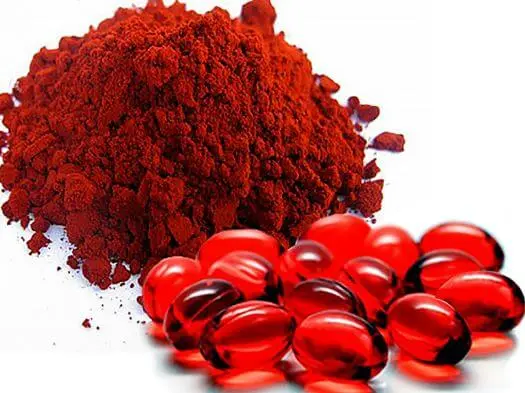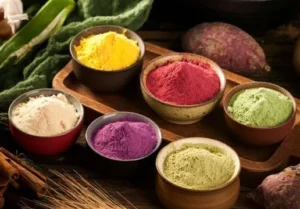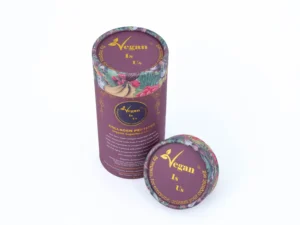The Benefits of Astaxanthin and Spirulina: A Vegan Alternative for Optimal Health
Astaxanthin is a powerful antioxidant known for its skin, eye, and cardiovascular benefits. It’s commonly found in marine organisms like salmon and shrimp. However, for those following a plant-based lifestyle, there are alternatives that offer similar benefits. One such superfood is spirulina, a blue-green algae, which provides antioxidant protection along with a broad spectrum of nutrients. In this blog, we’ll explore the benefits of astaxanthin and spirulina, highlighting how these two superfoods can support overall health and well-being.
What is Astaxanthin?
Astaxanthin is a carotenoid, a type of natural pigment found in certain algae that gives marine organisms their red or pink colour. Known for its antioxidant properties, astaxanthin helps protect the body from oxidative stress, which can contribute to aging and chronic diseases.
The Health Benefits of Astaxanthin
1. Antioxidant Protection
Astaxanthin is renowned for its potent antioxidant abilities. Antioxidants neutralise free radicals—unstable molecules that can damage cells and increase the risk of diseases like cancer, heart disease, and aging. Astaxanthin is highly effective at combating oxidative stress and is considered more powerful than vitamins C and E in this regard.
2. Skin Health and Anti-Aging
Astaxanthin is especially beneficial for skin health. Its antioxidant properties protect the skin from UV rays and environmental pollutants. Studies suggest that it can improve skin elasticity, reduce wrinkles, and increase moisture levels, providing a natural solution for aging skin.
3. Eye Health
Astaxanthin accumulates in the retina, where it helps reduce eye fatigue, protect against UV damage, and prevent age-related eye conditions like macular degeneration and cataracts.
4. Cardiovascular Health
Astaxanthin supports heart health by reducing inflammation and oxidative stress—key contributors to cardiovascular disease. Research indicates it may help lower blood pressure, reduce “bad” LDL cholesterol, and improve blood vessel function.
5. Muscle Endurance and Recovery
Astaxanthin can reduce muscle soreness and support recovery after exercise. Its anti-inflammatory properties also help enhance muscle endurance, reduce fatigue, and improve athletic performance.
Spirulina: The Vegan Alternative
While astaxanthin offers many health benefits, it’s not always accessible for those on a plant-based diet. This is where spirulina comes in. Spirulina, a blue-green algae, provides a vegan-friendly source of antioxidants, along with additional nutrients that contribute to overall health.
The Health Benefits of Spirulina
1. Antioxidant Power
Spirulina is rich in antioxidants, particularly phycocyanin, which gives it its blue-green colour. Like astaxanthin, phycocyanin helps neutralise free radicals and protect the body from oxidative damage. Spirulina’s antioxidant content supports healthy aging and reduces the risk of chronic conditions.
2. Boosts Immune Health
Packed with vitamins and minerals like B vitamins, iron, and magnesium, spirulina helps boost the immune system. It enhances the body’s natural defences, making it an excellent option for maintaining overall health.
3. Anti-Inflammatory Benefits
Spirulina is known for its anti-inflammatory properties, which can help manage conditions like arthritis and asthma. It also aids in reducing inflammation throughout the body, contributing to better overall well-being.
4. Nutrient-Dense Superfood
Spirulina is an incredibly nutrient-dense superfood. It offers a complete plant-based protein, essential amino acids, and a range of vitamins and minerals, making it ideal for vegans who may need to supplement their diet with specific nutrients, such as vitamin B12.
5. Energy and Endurance
Spirulina can help improve energy levels and endurance by supporting mitochondrial function, which is responsible for energy production in the body. It’s particularly useful for anyone looking to naturally boost energy and enhance physical performance.
Astaxanthin vs. Spirulina: How Do They Compare?
They are both potent antioxidants, but they differ in their benefits. Astaxanthin is especially effective for skin, eye, and heart health due to its powerful antioxidant properties. Spirulina, however, offers a broader spectrum of nutrients, including protein, vitamins, and minerals, making it a more comprehensive superfood for vegans.
While astaxanthin targets specific areas like skin and eye health, spirulina is a versatile supplement that supports overall wellness, from immune function to energy production.
Frequently Asked Questions
1. What’s the difference between astaxanthin and spirulina?
Astaxanthin is a carotenoid antioxidant with a focus on skin, eye, and cardiovascular health. Spirulina is a nutrient-dense algae that provides antioxidants like phycocyanin, along with protein, vitamins, and minerals, making it a more versatile superfood.
2. Can I take astaxanthin and spirulina together?
Yes, you can take both. They complement each other well—astaxanthin offers targeted antioxidant support, while spirulina provides broader nutritional benefits, making them a great combination for overall health.
3. Is spirulina a good vegan alternative to astaxanthin?
Yes, spirulina is an excellent vegan alternative. While it doesn’t contain astaxanthin specifically, spirulina provides similar antioxidant protection through phycocyanin, as well as additional nutrients like protein and vitamins.
4. Are there any side effects of taking astaxanthin or spirulina?
Both are generally safe when taken in appropriate amounts. Mild side effects like digestive discomfort or headaches may occur in some individuals. If you are pregnant, breastfeeding, or on medications, consult with a healthcare professional before use.
5. How can I incorporate spirulina into my diet?
Spirulina can be added to smoothies, juices, energy bars, or even sprinkled over salads and soups. Its strong flavour pairs best with fruits, vegetables, or other flavours you enjoy.
6. Can astaxanthin help with aging?
Yes, astaxanthin is widely known for its anti-aging effects. It protects the skin from UV damage, reduces wrinkles, and enhances skin elasticity. It also helps combat oxidative stress throughout the body.
7. What’s the best way to take astaxanthin or spirulina?
Astaxanthin is best absorbed with a meal containing fat, as it is fat-soluble. Spirulina can be consumed in powder or tablet form, ideally on a regular basis as part of a balanced diet.
The Key Takeaways
Astaxanthin and spirulina are both potent superfoods that offer exceptional health benefits. Astaxanthin provides superior antioxidant protection for the skin, eyes, and heart, while spirulina offers a more comprehensive range of nutrients to support overall health. Curious about how plant-based superfoods can support your health? Explore our range of premium vegan blends at VeganIsUs and learn how they can enhance your well-being. Start your journey to a healthier you today!







